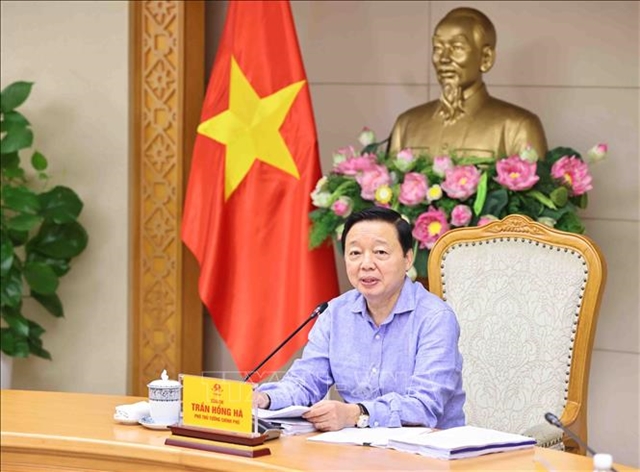_med.jpg) Economy
Economy


|
| Deputy Prime Minister Trần Hồng Hà chaired the meeting. VNA/VNS Photo |
HÀ NỘI — Deputy Prime Minister Trần Hồng Hà, Head of the National Steering Committee on Green Growth, has said criteria are urgently needed in order to develop the green economy.
He spoke at a meeting on promulgating the National Green Economic Sector System standards at the Government headquarters on Monday.
Speaking at the meeting, the Deputy PM emphasised that green criteria are very important for Vietnamese businesses to attract investment and integrate internationally.
Building a national green economic sub-sector system is needed to clarify issues related to political and legal bases, as well as awareness and approaches to existing economic sectors and emerging green economic sectors, he said.
While showing appreciation for the Ministry of Planning and Investment (MPI)'s responsibility in implementing its green growth strategy, the Deputy PM emphasised the need for integrating green criteria into the national economic system to implement policy as well as strategies, plans and laws on the green economy and the circular economy.
The classification system not only aims to incorporate green criteria into the current economic system, but also integrates a number of new economic sectors, such as investing in and restoring the natural environment, using new technology to provide environmental treatment services and renewable energy.
The Ministry of Natural Resources and Environment (MoNRE) is also urgently researching a set of national green criteria to submit to the Prime Minister for promulgation and as a basis for ministries and branches to classify industries and economic sectors.
The MPI is building a national statistical system on the green economy as a basis for monitoring and evaluation. The system focuses on a number of important indicators such as energy consumption for production compared to GDP, emissions index per GDP, State and social spending on the green economy, climate change and the environment.
Previously, according to a report from Deputy Minister of Planning and Investment Nguyễn Thị Bích Ngọc, the ministry was assigned the task of building a set of scientific criteria for green classifications in line with international practices. Supporting agencies have a more specific legal basis in selecting investment projects in ministries, branches and localities while quantifying and evaluating green growth.
Creating a green classification system is popular globally, with many countries and intergovernmental and non-governmental organisations making similar moves.
The two main goals that serve as a basis for policy building include issuing specific preferential policies or supporting access to green finance and green credit.
The MPI has also studied a number of documents issued by the MoNRE, the State Bank of Vietnam and the Ministry of Finance.
Currently, many other countries are taking a variety of approaches, generally defining criteria from top to bottom or specific to a single sector.
The MPI proposes a 'top-down' approach in which a system of national green economic sectors will be built corresponding to current economic sub-sectors and associated with international criteria.
"This green economic sector system ensures harmony and compatibility with Việt Nam's economic sector and a comprehensive, top-down approach. The national green economic sector system will build qualitative indicators that serve as the foundation for ministries and branches to continue to issue different quantitative indicators, depending on the classification purpose of each industry," said Ngọc.
At the meeting, representatives from the Ministry of Natural Resources and Environment, the Ministry of Industry and Trade, the State Bank of Vietnam and the Ministry of Justice also focused on discussing and analysing principles and criteria for building a green economy, attracting investment into the green economy, green classifications and building a national industry system.
Some said that there needs to be a common legal basis to adapt green standards for different industries, because each field has different technical properties. — VNS




